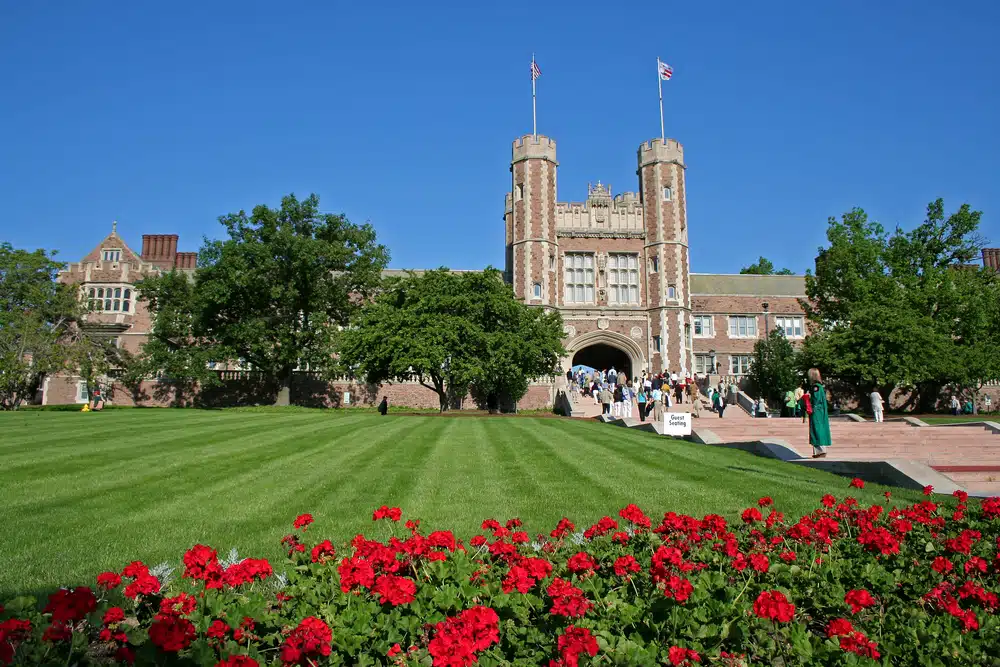How to Ace Your Washington University Secondaries
After successfully submitting your primary application, the next step in the medical school admissions process is responding to secondary essay prompts. Secondary essays are an opportunity to showcase your personality, and experiences, and fit with a specific medical school. When it comes to Washington University School of Medicine, their secondary essays are particularly important and require a thoughtful approach. In this article, we’ll explore strategies for understanding, writing, editing, and preparing for potential interviews for the Washington University in St. Louis secondary essays. By the end of this guide, you’ll be equipped with the knowledge and tools you need to ace your Washington University secondaries.
Understanding the Washington University School of Medicine in St. Louis Secondaries
As one of the top medical schools in the country, Washington University School of Medicine in St. Louis is highly selective in its admissions process. The school’s secondary essays are an essential component of the application, providing insight into an applicant’s fit with the institution’s values and mission.
Before delving into specific strategies, it’s important to understand the basics of the Washington University in St. Louis secondary essays. The medical school requires a series of essays, which can be found on the school’s website and are sent to applicants after completing their primary application.
These essays typically ask applicants to respond to several questions that highlight qualities, experiences, and values that are important to Washington University School of Medicine in St. Louis. The prompts can vary, but they are designed to give insight into the applicant’s fit with the medical school’s mission and values.
Importance of Secondaries in the Admissions Process
While the primary application provides an overview of an applicant’s academic achievements, work experience, and extracurricular activities, the secondary essays allow the admissions committee to gain a deeper understanding of an applicant’s personal values and characteristics.
Therefore, it’s crucial to recognize the importance of secondary essays in the admissions process. Secondary essays are an additional step that some medical schools use to screen and select the most promising and qualified applicants.
For Washington University School of Medicine in St. Louis, the secondary essays serve as a way for the admissions committee to evaluate the applicant’s fit for their program holistically. By understanding this importance, applicants can better focus on conveying their fit and value to the school in their responses.
It’s worth noting that secondary essays are not just an opportunity for applicants to showcase their writing skills. Instead, they provide a platform for applicants to demonstrate their unique qualities and experiences that align with the school’s values and mission.
Unique Aspects of Washington University School of Medicine in St. Louis Secondaries
Washington University in St. Louis has unique secondary essay prompts that help the school identify applicants that align with their core values, which include integrity, respect, excellence, diversity, and inclusivity. The prompts are often thought-provoking and require authentic and personal responses.
For example, one of the essay prompts asks applicants to describe a time when they demonstrated resilience in the face of adversity. Another prompt asks applicants to describe a time when they had to navigate a difficult ethical situation.
These prompts require applicants to reflect on their personal experiences and values, providing the admissions committee with a deeper understanding of who they are as individuals.
It’s important to note that there is no one-size-fits-all approach to responding to the Washington University in St. Louis secondary essays. Each applicant’s experiences and values are unique, and therefore, their responses should be as well. However, by taking the time to research and understand the values and character of the school, applicants can convey why they’d be an excellent fit for the program.
In conclusion, the Washington University School of Medicine in St. Louis secondary essays are a crucial component of the admissions process. They provide applicants with the opportunity to showcase their unique qualities and experiences that align with the school’s values and mission.
By understanding the importance of secondary essays and taking the time to craft thoughtful and personal responses, applicants can increase their chances of being admitted to this prestigious medical school.
Tips for Writing Compelling Secondaries
Now that you have a better understanding of the secondary essay prompts at Washington University in St. Louis, it’s important to consider strategies for writing excellent responses. Below are some tips that will help applicants craft compelling essays:
Researching the School’s Values and Mission
The first step in writing impactful secondary essays is to do your research. Before starting to brainstorm your responses, familiarize yourself with the values and mission of Washington University School of Medicine in St. Louis.
Visit the school’s website, and read up on their programs, values, and achievements. Knowing what makes the school unique will help you tailor your responses and emphasize how your experiences fit the school’s mission and values.
Washington University in St. Louis is a top-tier research university known for its commitment to excellence in education, research, and patient care. The university is committed to creating an inclusive and diverse community that fosters creativity, innovation, and collaboration.
The school’s values include a commitment to academic excellence, integrity, respect, and responsibility. By understanding the school’s values and mission, you can craft responses that align with these principles and demonstrate your fit with the school.
Tailoring Your Responses to the Prompts
After researching the school’s values and mission, take some time to analyze the specific prompts and tailor your responses accordingly. Consider what they are asking and what types of qualities and experiences the school is looking for in a successful applicant. Use these insights to craft responses that showcase your unique experiences and abilities and highlight how they make you an excellent fit for Washington University School of Medicine in St. Louis.
For example, if the prompt asks you to discuss a challenge you have faced, think about how that challenge has shaped your values and prepared you to succeed at Washington University in St. Louis.
Use specific examples to demonstrate your resilience, problem-solving skills, and ability to work well under pressure. By tailoring your responses to the prompts, you can demonstrate your fit with the school and stand out from other applicants.
Demonstrating Your Fit with the School
Washington University in St. Louis is seeking applicants who align with its mission and values. As a result, it’s essential to demonstrate your fit with the school in your responses. Use specific examples to show how your values align with those of the school and emphasize how your experiences have prepared you to thrive in the program.
For instance, if the prompt asks you to discuss your leadership experience, consider how your leadership style aligns with the school’s commitment to collaboration and innovation. Use examples to demonstrate how you have successfully led teams and how your leadership style has helped you achieve your goals. By demonstrating your fit with the school, you can show the admissions committee that you are a strong candidate for admission.
Balancing Personal Anecdotes and Professional Experiences
Washington University School of Medicine in St. Louis wants to get to know the personal and professional sides of their applicants. As you craft your essays, balance using anecdotes from your personal life with highlighting your professional experiences. Use examples that showcase your unique attributes and demonstrate how you will fit in and benefit from Washington University School of Medicine in St. Louis’ diverse community.
For example, if the prompt asks you to discuss a time when you demonstrated empathy, consider how your personal experiences have shaped your ability to connect with others. Use examples to demonstrate how your empathy has helped you build strong relationships with colleagues, patients, or clients.
By balancing personal anecdotes with professional experiences, you can demonstrate your well-roundedness and show the admissions committee that you have the skills and attributes needed to succeed at the Washington University School of Medicine in St. Louis.
Breaking Down the Common Secondary Prompts
Washington University in St. Louis is a highly respected institution that attracts students from all over the world. As a top-tier university, it uses a range of secondary essay prompts to identify the best candidates for its medical school program. Each prompt highlights different values and characteristics of a successful student, giving applicants the opportunity to showcase their unique strengths and experiences.
“Why Washington University in St. Louis?” Prompt
When answering this prompt, it is important to show that you have done your research on Washington University in St. Louis and understand what sets it apart from other medical schools. Consider the university’s programs, values, and resources, and highlight those that interest you the most.
For example, you might be drawn to the school’s commitment to interdisciplinary research or its emphasis on community service. Be sure to explain why these factors are important to you and how they align with your personal and professional goals.
Additionally, it is important to show how you would contribute to the community of learners at Washington University School of Medicine in St. Louis. This might involve highlighting your leadership skills, your commitment to diversity and inclusion, or your passion for a particular research area. Whatever your strengths may be, be sure to explain how they would benefit the school and its students.
Diversity and Inclusion Prompt
Washington University in St. Louis values diversity and inclusion, and this prompt is an opportunity to showcase how your experiences and background have influenced your understanding and appreciation of these values.
Consider discussing how you have worked to promote diversity and inclusion in your community, or how your own experiences as a member of a marginalized group have shaped your perspective.
Be sure to explain how you will contribute to the medical school’s commitment to inclusivity, whether through your academic work, your extracurricular activities, or your interactions with your fellow students.
Overcoming Challenges Prompt
Medical school is a rigorous and demanding program, and Washington University School of Medicine in St. Louis is looking for students who have demonstrated resilience and perseverance. When answering this prompt, share a challenge that you have overcome and explain how this experience has prepared you for the rigors of medical school.
This might involve discussing a personal setback, a difficult academic experience, or a professional challenge. Be sure to explain how you were able to overcome this obstacle, what you learned from the experience, and how it has made you a stronger and more determined person.
Research and Clinical Experience Prompt
Finally, this prompt is an opportunity to showcase your academic and professional experiences and demonstrate your readiness for medical school. Share a research or clinical experience that has influenced your desire to attend medical school and explain how it has prepared you for the challenges of the program.
This might involve discussing a research project that you conducted, a clinical rotation that you completed, or a volunteer experience that you found particularly meaningful. Be sure to emphasize how you will make use of the resources and opportunities provided by Washington University School of Medicine in St. Louis, and how your experiences will help you contribute to the school’s academic community.
Strategies for Editing and Revising Your Secondaries
After crafting your responses, it’s important to give your secondary essays a critical review. Here are some strategies for editing and revising your Washington University in St. Louis secondaries:
Ensuring Clarity and Conciseness
Secondary essays should be clear, concise, and to the point. Use active voice and focus on providing specific examples to demonstrate your experiences and qualities. It’s important to remember that the admissions committee will be reviewing hundreds, if not thousands, of applications, so making your responses clear and easy to read is essential. Avoid wordiness and make sure that each sentence has a purpose and conveys your message effectively.
For example, if you are discussing your experience volunteering at a hospital, don’t simply state that you volunteered at a hospital. Instead, provide specific details about what you did, what you learned, and how it impacted you. This will make your response more engaging and memorable.
Seeking Feedback from Trusted Sources
After you’ve completed a draft of your secondary essays, seek feedback from trusted sources. Consider reaching out to advisors, friends, or family members who understand the process and can provide constructive criticism. Gaining different perspectives will help you refine your responses and ensure that your answers are clear and concise.
It’s important to keep in mind that while feedback can be helpful, ultimately the responses should reflect your own experiences and voice. Don’t be afraid to make changes based on feedback, but also trust your own instincts and judgment.
Avoiding Common Mistakes and Clichés
Avoid common mistakes such as repeating information already provided in your primary application, being overly generic or cliché, or generalizing about the medical profession. Instead, make sure that each response adds unique value and provides insight into your character, experiences, and potential for success in the program.
For example, rather than simply stating that you are passionate about medicine, provide specific examples of experiences that have fueled that passion. This will make your response more personal and memorable.
Fine-Tuning Your Responses for Maximum Impact
Finally, fine-tune your responses to maximize their impact. This means focusing on making sure the writing is coherent, the tone is appropriate, and each response is tailored to the prompts. Use strong action verbs, and avoid using phrases like “I think,” “I believe” and similar phrases. Keep in mind that the goal is to provide context and insight into your experiences and character.
Remember that the admissions committee wants to get to know you as a person, so don’t be afraid to let your personality shine through in your responses. By following these strategies and putting in the time and effort to craft thoughtful and engaging responses, you’ll be well on your way to standing out in the application process.
Preparing for Potential Interviews
After submitting your secondary essays, the next step is the potential interviews. It’s important to have a strategy in place for preparing for these interviews.
Familiarizing Yourself with the MMI Format
Washington University School of Medicine in St. Louis uses the Multiple Mini Interview (MMI) format for their interviews. This format consists of a series of short interviews, each lasting about five to ten minutes and assessing specific qualities and values. Practice with sample MMI-style interview questions to familiarize yourself with the format and feel comfortable communicating your thoughts quickly and concisely.
Practicing Common Interview Questions
Prepare for potential interview questions by practicing commonly asked questions. Use resources such as the Washington University School of Medicine in St. Louis website and medical school forums, and practice interviewing with friends or family members. Focus on sharing relevant experiences that showcase your skills and values.
Highlighting Your Unique Qualities and Experiences
During interviews, make sure to highlight your unique qualities and experiences. Use specific examples that showcase how you align with the school’s mission and values, and emphasize how your experiences have prepared you for a career in medicine.
Final Thoughts and Additional Resources
Preparing strong Washington University in St. Louis secondary essays can be challenging, but by following the strategies outlined in this guide, you’ll be well-equipped to craft thoughtful and compelling responses. Remember to take your time, thoroughly research the school’s values and mission, and tailor your responses accordingly.
Additionally, Washington University in St. Louis has a range of resources available on its website to help applicants prepare for the admissions process. Don’t hesitate to utilize these resources and ask for help whenever necessary. Ultimately, the key to acing your Washington University in St. Louis secondaries is to be authentic, showcase your ability to add value to the program and demonstrate your fit with the school’s mission and culture.
If you’re set on getting into a world-class college but aren’t sure how to make it happen, we can help! AdmissionSight is a leading college entrance expert with over a decade of experience helping students just like you get into the schools of their dreams.
At AdmissionSight, we focus on offering a wide range of services, all aimed at helping students perfect their applications to catch the attention of admissions officers. Contact us today to schedule a free consultation and learn more about what we offer.










































